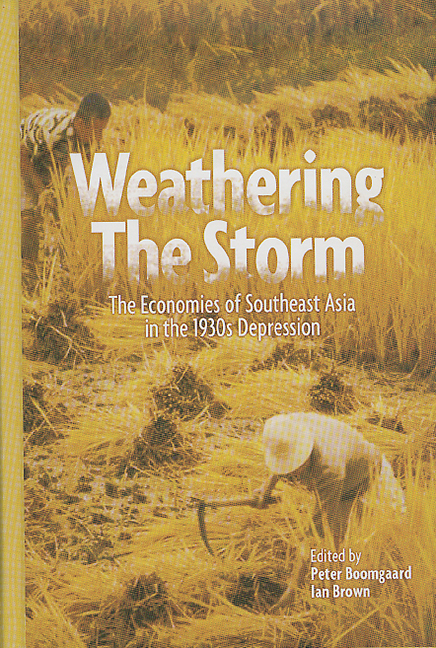Book contents
- Frontmatter
- Contents
- List of Tables
- List of Figures
- Acknowledgements
- List of Contributors
- 1 The Economies of Southeast Asia in the 1930s Depression: An Introduction
- PART I MATERIAL CONDITIONS
- 2 Surviving the Slump: Developments in Real Income During the Depression of the 1930s in Indonesia, Particularly Java
- 3 The Philippines in the Great Depression: A Geography of Pain
- 4 Uneven Impact and Regional Responses: The Philippines in the 1930s Depression
- 5 Material Conditions in Rural Lower Burma During the Economic Crisis of the Early 1930s: What the Cotton Textile Import Figures Reveal
- PART II AGRICULTURAL STRATEGIES
- PART III TRADING COMMUNITIES
- PART IV THE STATE'S RESPONSE
- Index
5 - Material Conditions in Rural Lower Burma During the Economic Crisis of the Early 1930s: What the Cotton Textile Import Figures Reveal
from PART I - MATERIAL CONDITIONS
Published online by Cambridge University Press: 21 October 2015
- Frontmatter
- Contents
- List of Tables
- List of Figures
- Acknowledgements
- List of Contributors
- 1 The Economies of Southeast Asia in the 1930s Depression: An Introduction
- PART I MATERIAL CONDITIONS
- 2 Surviving the Slump: Developments in Real Income During the Depression of the 1930s in Indonesia, Particularly Java
- 3 The Philippines in the Great Depression: A Geography of Pain
- 4 Uneven Impact and Regional Responses: The Philippines in the 1930s Depression
- 5 Material Conditions in Rural Lower Burma During the Economic Crisis of the Early 1930s: What the Cotton Textile Import Figures Reveal
- PART II AGRICULTURAL STRATEGIES
- PART III TRADING COMMUNITIES
- PART IV THE STATE'S RESPONSE
- Index
Summary
This chapter works from the proposition that as the economic crisis struck Lower Burma with full force in the final months of 1930, the agriculturists in the vast Irrawaddy delta — committed to the cultivation of rice for export — created or discovered a number of strategies to defend their material condition. They increased their sales of paddy — by expanding the area under cultivation or by diverting a larger share of the harvest to the market — in an attempt to maintain their money income as rice prices fell. They resisted the demands of the tax-collector, the landowner, and the moneylender, sometimes violently or with the threat of violence but often simply by absconding: alternatively, landowners, moneylenders, and the colonial administration calculated that, given these circumstances, it would be futile, unnecessarily provocative, or unjust to seek to press their claims in full or even in part. And finally they found a measure of relief in the fall in the prices of articles of common consumption, including, notably, imported textiles.
Support for this broad proposition can be found scattered through the contemporary records. For example, a settlement report noted that during the harvest months in 1932, tenants in Hanthawaddy District, when required to settle rent demands, simply ‘refus[ed] to pay anything more than what [they] could well spare’, despite the fact that rents had commonly been agreed between landowner and tenant in writing. Writing to their Rangoon bankers in 1934, a group of prominent Chettiar moneylenders reported that in their current dealings with the delta agriculturist, ‘we are not able to collect even a small portion of our [advances], not to speak of the arrears of interest’. An official note from Rangoon to Delhi at the beginning of 1931 explained that district officers involved in collection of the capitation tax had been instructed ‘to avoid unduly harassing’ assessees, and ‘to exercise careful discretion’ before initiating legal proceedings in cases of non-payment.
- Type
- Chapter
- Information
- Weathering the StormThe Economies of Southeast Asia in the 1930s Depression, pp. 109 - 120Publisher: ISEAS–Yusof Ishak InstitutePrint publication year: 2001

